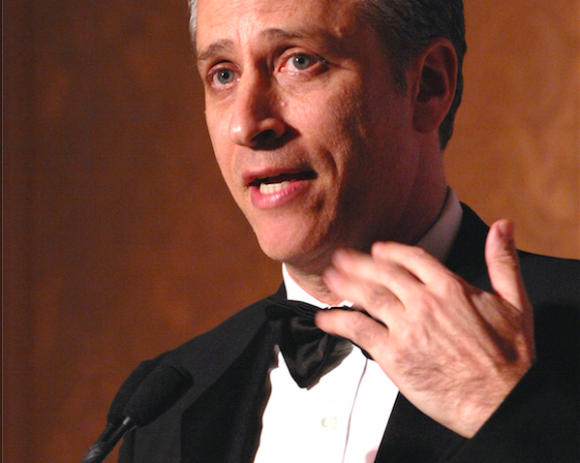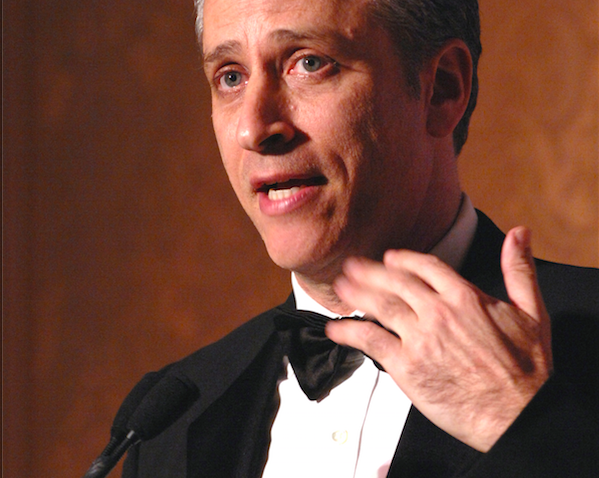aNewDomain — Jon Stewart’s decision to leave “The Daily Show” at what critics universally call the top of his game serves as yet another reminder of just how humor-deprived contemporary American television has become.
Stewart is, like his fellow Comedy Central alum Stephen Colbert and standup megastar Louis C.K., one of the most overrated talents of our time. Not that he isn’t fast on his feet – he is. Not that the camera doesn’t love him – it does. Not that he doesn’t understand timing – he does.
 What Stewart isn’t is falling-down-on-the-floor hilarious. His fits and starts, lurching style of monologue elicits plenty of knowing guffaws and the occasional eye-rolling laugh at the expense of, typically, an ideologically inconsistent politician. But because he refuses to take the chance of alienating his audiences by offending them, he never risks falling off the high wire you have to climb in order to achieve comedy greatness.
What Stewart isn’t is falling-down-on-the-floor hilarious. His fits and starts, lurching style of monologue elicits plenty of knowing guffaws and the occasional eye-rolling laugh at the expense of, typically, an ideologically inconsistent politician. But because he refuses to take the chance of alienating his audiences by offending them, he never risks falling off the high wire you have to climb in order to achieve comedy greatness.
If you want to be really funny, you have to be dangerous.
(To illustrate this point, I was going to cite a farm-based joke by Rudy Ray Moore, the black comedian and Blaxploitation filmmaker of the 1970s and 1980s, but it’s so outrageous and so obscene that I’m pretty sure I’ve never work again if I did. Now that’s some wickedly funny stuff.)
I remember – actually, as a cartoonist, I am traumatized by recollecting – a female friend telling me why she turned against the late great George Carlin.
She loved Carlin. She owned many of his albums. She had seen him in concert many times. She couldn’t stop talking about how brilliant he was. Then, she explained, he said one joke that offended her feminist sensibilities. After that, he was dead to her.
I was baffled and a little disgusted. “In baseball, if you hit the ball 35 percent of the time, you’re a God. So you need to tell me that George Carlin told thousands of jokes that you loved, gave you hours of pleasure and countless laugh out loud moments, but because of one joke, he was dead to you? You fired a guy with a .999 batting average!” (I’m more in the 30 percent range.)
He was.
Here’s the joke that pissed her off: “Have you ever noticed that the women who are against abortion are women you wouldn’t want to fuck anyway?”
Neither Jon Stewart nor Stephen Colbert nor John Oliver are ever going to say anything that funny. Or that mean. That’s not their business model. They walk between a very narrow set of lines defined by decades of political correctness.
Which is fine. Really. I don’t have a problem with what they do. The issue isn’t that they play it safe; the problem is that America is so starved for comedy that they manage to pass this bland stuff off as the real thing. The only reason that they have been so successful is that, following decades of horrible late-night tedium like Jay Leno, David Letterman and the inexplicably still on the air “Saturday Night Live” which, contrary to conventional wisdom was never very funny but is certainly much less so now.
“The humor that makes me laugh hardest is the material I know would offend or insult someone else,” wrote “Dilbert” cartoonist Scott Adams in 2008. “But offending isn’t enough. The audience gets more out of humor if the messenger is putting himself in danger.” Adams says it’s a universal law, and I agree with him. It certainly applies to me. My most outrageous work – on 9/11 widows, Pat Tillman, making fun of American soldiers fighting in Afghanistan and Iraq – is also some of my funniest. And it definitely put me in danger: I stopped counting the death threats at 1000. And I lost some good jobs.
Every now and then, someone has to kill a humorist to remind us how dangerous good humor can be.
Of all things, last month’s massacre of – whether you like them or not, outrageously funny – cartoonists at the Charlie Hebdo magazine in Paris reminded some Americans of what exists elsewhere, but has been lost here, or perhaps never existed: an over-the-top, ribald, take-no-prisoners culture of satire, particularly in print but also on television.
Every few years, I make the rounds in Hollywood trying to pitch TV show ideas. During the peak of the Bush years, and before the idiotic “That’s My Bush!,” I presented to executives all over Los Angeles my idea for a comedy, either live action or animated, that made fun of the Bush family and the president’s top officials. The hook was, Bush was actually a reluctant leader, didn’t want to be there, and was secretly brilliant but didn’t want to let on. His daughter Jenna was really running the show. Dick Cheney was a softhearted wimp who broke into tears over nothing.
Maybe the show was a dumb idea, I don’t know, I’m not a TV executive. But that’s not the point of the story. The point is, Hollywood was so satirically illiterate that they rejected the idea based on legal fears: they were worried about being sued by the first family. As I repeatedly explained, Bush and Cheney and their families were public figures, so it would have been possible to mock them six ways till Sunday without having to worry about a successful lawsuit. Besides, almost every other Western country on earth had some sort of comedy show that sent up their political leaders: France, Germany, Spain, Portugal, even, at the time, Russia. They were all quite popular.
I explained that, as an editorial cartoonist, I routinely say all sorts of terrible things about the president, and yet, here I am, not in prison, at least not yet. But the pitch meetings never got beyond the legal questions. That’s how safe TV has become: they don’t even know what the legal landscape looks like.
There have been some bright spots. But you have to wonder, would anyone greenlight “The Simpsons” today? How about “South Park”?
There is no denying the success of the Comedy Central approach. Millennial viewers who would never watch the evening news nevertheless enjoy, and learn from, the fake news format pioneered by Stewart and Colbert. But make no mistake: that is not hard-hitting political satire.
Louis C.K., who is undeniably much funnier than those two, nonetheless likes to keep things safe as well. Although these incredibly incisive when issuing humorists observations about divorce, relationships, parenthood and popular culture, he generally shies away from straight-ahead politics.
The fact that it hasn’t always been this way tells us that things can change. In the 1960s and 1970s, even the relatively tame Bob Newhart and Bill Cosby routinely delivered more trenchant humor than you’ll find on television today. Richard Pryor, of course, was a God. Hell, Lenny Bruce got arrested! That’s not going to happen to the big-time comedians that we are constantly being told are so funny today.
Don’t get me wrong, there’s plenty of great humor out there – but not on the national stage, not on network television.
So now that the big Comedy Central stars have left, Colbert to the blander than bland Tonight Show (notice how no one talks about him anymore?), Stewart to whatever he figures out, we have an opportunity to reconsider the fact that, as a humor-loving people, Americans have the God-given right to watch dangerously funny TV shows – and there has never been a time when they were more needed.
For aNewDomain, I’m Ted Rall.
Cover image:“Stewart – USO-Metro Merit Awards 2” by Defense Dept. photo by Air Force Tech. Sgt. Adam M. Stump – http://www.defenselink.mil/PhotoEssays/PhotoEssaySS.aspx?ID=637 (description)http://www.defenselink.mil/dodcmsshare/photoessay/2008-03/hires_080325-F-6684S-771ajpg.jpg (image). Licensed under Public Domain via Wikimedia Commons.














I remember when Rall’s cartoons used to be more consistently funny than they are now, but even at his best he was never funnier than John Stewart.